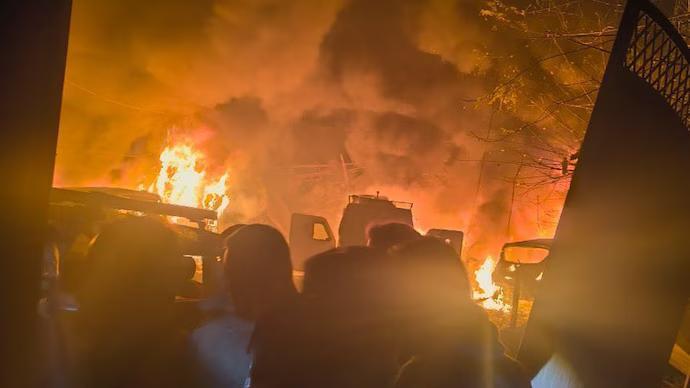
Find it Absurd: J&K CM as Helicopter Service Not Allowed in Amarnath Yatra Route
The upcoming Amarnath Yatra, one of the most revered pilgrimages in Hinduism, is set to begin soon, but the journey to the sacred cave shrine has hit a snag. The Jammu and Kashmir government has declared the Amarnath Yatra route as a ‘no flying zone’ as part of enhanced security measures. This decision has left many, including the Chief Minister of Jammu and Kashmir, Omar Abdullah, scratching their heads.
In a recent statement, Omar Abdullah expressed his disappointment and incredulity at the decision, terming it “absurd”. He emphasized that this move could send the wrong message to the rest of the nation about the situation in Jammu and Kashmir. The Chief Minister’s remarks have sparked a heated debate, with many questioning the logic behind the decision.
The Amarnath Yatra, which attracts lakhs of devotees from across the country, is a significant cultural and economic event for Jammu and Kashmir. The route, which spans over 45 km, passes through some of the most challenging terrain, including treacherous mountain paths and dense forests. The ‘no flying zone’ declaration means that helicopters, which are commonly used to transport pilgrims and supplies, will no longer be allowed to operate in the area.
The decision has raised concerns about the safety and logistics of the Yatra. The absence of helicopters will require pilgrims to rely on trekking, which could be challenging, especially for the elderly and those with mobility issues. Moreover, the lack of aerial support will make it difficult for the administration to transport essential supplies, including food and medical aid, to the pilgrims.
The Jammu and Kashmir government has cited security concerns as the reason behind the decision. In recent years, the region has witnessed increased militant activity, and the government is keen to ensure the safety of pilgrims. However, many experts argue that the ‘no flying zone’ declaration is an overreaction, and that alternative security measures could have been implemented to ensure the Yatra’s success.
The decision has also led to a backlash from local residents and pilgrims, who are upset about the disruption to their daily lives. Many have expressed concerns about the impact on the local economy, which relies heavily on tourism and pilgrimages. The ‘no flying zone’ declaration is expected to have a significant impact on the tourism industry, with many travel agencies and tour operators already reporting cancellations and postponements.
Despite the controversy surrounding the decision, Omar Abdullah has expressed his happiness that the Yatra is going to start soon. The Chief Minister’s statement has been seen as a balancing act, acknowledging the security concerns while also emphasizing the need to ensure the smooth conduct of the Yatra.
The Amarnath Yatra, which is expected to begin on June 30, is a testament to the resilience and devotion of the millions of pilgrims who undertake the challenging journey every year. The ‘no flying zone’ declaration may add an extra layer of complexity to the process, but the spirit of the Yatra remains unchanged.
As the pilgrims prepare to embark on their sacred journey, it is essential to strike a balance between security concerns and the needs of the devotees. The Jammu and Kashmir government must ensure that the necessary measures are taken to protect the pilgrims, while also minimizing the disruption to their daily lives.
In conclusion, the ‘no flying zone’ declaration is a decision that has sparked a heated debate in Jammu and Kashmir. While security concerns are understandable, the decision’s impact on the Yatra’s logistics and the local economy cannot be ignored. As the Amarnath Yatra begins, it is crucial that the government and stakeholders work together to ensure a safe and successful pilgrimage for all.





